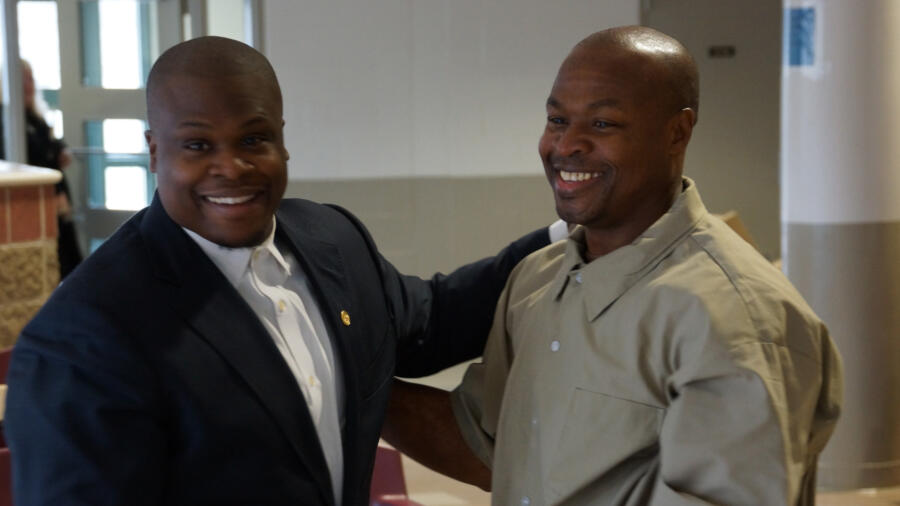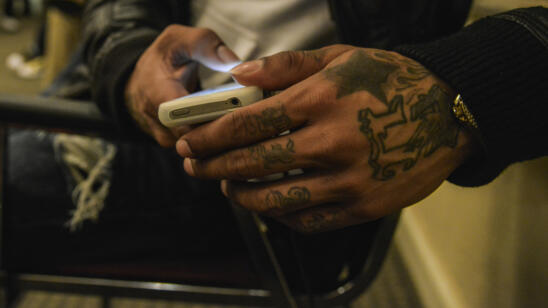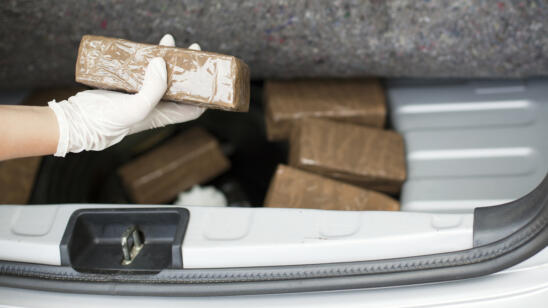While one of the biggest drug kingpins in Washington, D.C. remains in a federal penitentiary, his namesake son is helping children with a parent in prison.
Tony Lewis Jr.—who was 9 when his father Tony Lewis Sr. was arrested and sentenced to life in prison for his involvement with one of the city’s largest drug operations—hopes to change perception of his family’s name. After becoming the first man in his family to graduate from college, he started helping more children with incarcerated parents, as well as former inmates reentering their communities. In 2015 he released his memoir, “Slugg: A Boy’s Life in the Age of Mass Incarceration.”
Lewis founded the nonprofit Sons of Life, which serves young people with incarcerated parents through mentorships—among other things, he takes them on trips to sporting events, arranges parent-teacher video conferences between their incarcerated loved ones and schoolteachers, and pushes for local and national school systems to improve the resources and the support they provide to children like them. He talks to us about his struggle getting people to understand that when a person goes to prison, their family goes with them.
Why advocate for children with incarcerated parents?
Children with incarcerated parents need help because they experience constant trauma based on their parent(s) being incarcerated. Research shows us they are also much more likely to experience other adverse childhood experiences (ACE) juxtaposed to children that do not have an incarcerated parent. Some of those ACE’s: living in poverty, experiencing abuse, having a mentally-ill parent, having a parent addicted to drugs, and experiencing and witnessing acts of violence.
I know there is such a need for those young people to be supported. Our school systems aren’t set up to address that issue. [They] really need to rev up their efforts. People see mass incarceration as an issue that is exclusive to the people incarcerated.
How do the kids benefit from the trips you take them on and other forms of mentoring you do?
My mentoring consists of exposure, emotional support, life skills, and advice related to school, employment, decision-making and conflict resolution. The trips are merely a place to hang out, a conduit to create a comfortable environment to have serious conversations about what is going on in their lives, particularly their relationship to their incarcerated parent.
How do you help formerly incarcerated individuals return to society?
I build relationships with the broader business community and vocational-training community so we can create a seamless continuum for people coming home—to get them engaged with employment or training so that they can honestly become positive contributing members of society.
I even go into the prisons sometimes to familiarize soon-to-be released inmates about resources available to them post-release. I work directly with individuals to get them ready for those opportunities, really focusing in on behavior, mindset change, sound decision-making, and job readiness. So, when I’m able to connect the dots for them, not only will they identify gainful employment or get engaged into training, but they will be successful there.
How many of them have families/young children?
The people I see, in my work and in my role as a chair on the Mayor’s Commission on Reentry and Returning Citizens Affairs [and as a vocational development coordinator at the Court Services and Offender Supervision Agency, a federal agency that provides parole and probation services for offenders], 65-75 percent of them have children.
I think nationally, 50 percent of inmates have kids, and out of that 50 percent, most are under 10. In the U.S., you have about 2.3 million people incarcerated, one out of 14 children has an incarcerated parent, one out of nine Black children has an incarcerated parent. This is definitely an American issue.
How do you stay motivated? Why do you continue to work in this area?
I stay motivated whenever I am able to help people move forward. From people getting jobs to people telling me they were in a class of mine 10 years ago, I see them in the store and they say they just closed on a home, or when youngins I mentored go to college. I get so many affirmations every day that my work isn’t in vain.
What is the hardest part of your work and activism?
The hardest thing about my job is getting people to see the humanity in the formerly incarcerated, to see them as fathers and mothers, and people that deserve a second chance. For children with incarcerated parents, [it’s] getting people to see them as affected by mass incarceration even though they are not the inmate.
A lot of times it’s not just that you have an incarcerated parent. You’re typically growing up in a similar environment or neighborhood as your incarcerated parent, and sometimes those other things that exist in that neighborhood are what’s going to heighten your likelihood to follow in those footsteps.
Did President Obama, before leaving the White House, commute your father’s sentence?
I wasn’t successful, in [getting my] dad’s [sentence commuted], but some of my advocacy was able to help the passing of the Drug Minus Two [amendment]. The (U.S.) Sentencing Commission voted to pass the two-point reduction, which helped a lot people, even more than commutations [including the father of two of my mentees]. People got sentencing reductions. My father wasn’t granted that [either] but a lot of other people were. We continue to fight on behalf of my dad.


